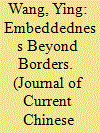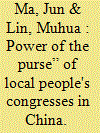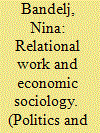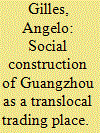|
|
|
Sort Order |
|
|
|
Items / Page
|
|
|
|
|
|
|
| Srl | Item |
| 1 |
ID:
179292


|
|
|
|
|
| Summary/Abstract |
The local party-state has always been a major source of extrajudicial influence in China. Drawing on interviews with judges, this article examines the impact of Xi Jinping's ambitious judicial centralization reforms, which are aimed at enhancing judicial autonomy by transferring authority over local court personnel and finances from local to provincial level. It finds that the reforms have achieved limited results. Although many appointment and budgetary powers were formally transferred to the provincial level, the local party-state retains considerable influence in both areas owing to its superior manpower, local knowledge and, in the case of developed regions, financial resources. Moreover, the local party-state maintains significant informal influence over the courts, which require many forms of discretionary assistance from various state organs – ranging from appropriating land for new courthouses to providing police protection for remote tribunals – in order to function. This setback highlights the depth and complexity of the courts’ political and economic embeddedness and serves as a reminder of the inherent difficulty of institutionalizing judicial autonomy, however limited, in a large and diverse party-state.
|
|
|
|
|
|
|
|
|
|
|
|
|
|
|
|
| 2 |
ID:
157093


|
|
|
|
|
| Summary/Abstract |
Orthodox approaches to managing Himalayan rivers endorse a singular focus on water as a resource to be harnessed for national security and economic progress, as epitomised by the proposed acceleration of large-scale hydropower construction in the Brahmaputra basin. In reality, existing large-scale hydropower development in the region frequently involves corruption, environmental destruction and forced displacement. This paper argues for an alternative approach to understanding the role of water in India's extractive zones within and beyond the boundaries of the nation, utilising the notions of ‘embeddedness’, ‘hydro-informality’ and ‘rescaling politics’. It is argued that reframing the river in this way can open up space for more just and sustainable practices.
|
|
|
|
|
|
|
|
|
|
|
|
|
|
|
|
| 3 |
ID:
179558


|
|
|
|
|
| Summary/Abstract |
North Korea today is a most unusual post-socialist state. Market actors and market prices are integral to economic life, but private property remains illegal, and private enterprise outside the household is de jure non-existent. In such an institutional context, some market processes are more autonomous in relation to the state, while others are more embedded within state structures. In this article, we offer a theoretical account of the shape that North Korea's market economy has taken, developed from a set of fishing industry case studies. We note four broad categories of enterprises: closely embedded, loosely embedded, semi-autonomous, and autonomous. By relative autonomy/embeddedness we mean control over fixed assets, cash flow, and operational decisions such as wage and price setting. We postulate three major determinants of embeddedness/autonomy: (1) relative strategic resource scarcity between state and market actors, (2) monitoring costs, and (3) institutional evolution that reflects these realities, though to varying extents.
|
|
|
|
|
|
|
|
|
|
|
|
|
|
|
|
| 4 |
ID:
165319


|
|
|
|
|
| Summary/Abstract |
When and why do friendly states deliberately share and unwittingly accept fabricated intelligence about others? Recent work on the interpersonal foundations of security cooperation suggests intelligence liaison is a type of embedded relationship that requires a dependable route for exchange (close personal ties) and a consistent record of exchange (reliably meeting expectations). We extend this argument to show that the relational embeddedness underpinning truthful intelligence liaison also explains the sharing of fabricated intelligence. We argue that intimate personal relations and a history of reliable exchange create a channel for effectively transmitting false information, for the recipient is unlikely to challenge its authenticity, and that violated cooperative expectations provide a reason for attempting to deceive a partner. Drawing on extensive archival research, we evaluate our theory by analyzing Britain's decision to share fabricated intelligence about Germany with the United States in 1941.
|
|
|
|
|
|
|
|
|
|
|
|
|
|
|
|
| 5 |
ID:
147196


|
|
|
|
|
| Summary/Abstract |
How does a group of Uyghur traders from a village in Atush (Xinjiang, China) end up with a stock of unsellable rubber sandals in Kadamjay (Batken, Kyrgyzstan), and why don’t they compete according to market principles? This article explores the social investments of the traders and their families, and reveals their behaviour to be rational, both economically and socially. It illuminates the business and daily life of Uyghur traders in southern Kyrgyzstan, an environment that is increasingly challenging and uncertain. The examination of exchange relations between their households explains why the traders cooperate as they do and also why they do not cooperate more. Economic rationales and social obligations prove to be mutually embedded. This insight expands and deepens a nascent analytical approach that recognizes social motivation for economic activities in Central Asia alongside undeniable economic incentives. This approach has much to gain from being more explicitly reconnected to classical anthropological theories of gift giving.
|
|
|
|
|
|
|
|
|
|
|
|
|
|
|
|
| 6 |
ID:
189902


|
|
|
|
|
| Summary/Abstract |
The internationalisation of Chinese non-governmental Organisations (NGOs) is an emerging phenomenon. As new international development actors, how independent are Chinese NGOs from the Chinese state? Based on interviews with eighteen Chinese NGOs and an analysis of secondary sources, the study finds that the internationalisation of Chinese NGOs is variegated rather than solely state-led. The state is not closely involved in much of the internationalisation processes of a majority of Chinese NGOs. However, all Chinese NGOs with overseas operations avoid overstepping a political boundary that is tacitly understood by both NGOs and the state. To explain the duality of both uniformity and diversity among Chinese NGOs, this study develops an embeddedness framework that disaggregates state influences into a primary layer of systemic regulatory guidance that affects all Chinese NGOs, and a secondary layer of influence over NGOs’ operations (initiation, financing, and implementation), within which the varying levels of governmental influence upon different NGOs lie.
|
|
|
|
|
|
|
|
|
|
|
|
|
|
|
|
| 7 |
ID:
157731


|
|
|
|
|
| Summary/Abstract |
The regionalisation of the world economy is one of the most important developments in global governance in the past two decades. This process has seen ‘inter-regional’ economic agreements emerge between two or more regional groupings. Drawing mainly on the European Union’s external relations, observers accordingly point to the growing importance of regional actors, explaining their agency (or ‘actorness’) with regional attributes such as (supranational) institutional design, size, and member state cohesion. This article challenges this dominant explanation of regional agency. It argues that regional actors are socially, politically, and historically ‘embedded’. Agency reflects the contingency of regional integration processes, the motivations that underpin those processes, and the specific relationships between regions and third parties. This approach explains an important case of inter-regionalism from the Asia-Pacific: CER-ASEAN relations. Since the early 1990s, Australia and New Zealand have used their ‘Closer Economic Relations’ trade agreement for relations with the Association of Southeast Asian Nations. This reflects the ambitions of Australasian officials to shape processes of Asian-Pacific regionalism, and the interests of ASEAN officials in consolidating their own process of transnational market-making. Here, regional agency owed to a transforming world economy and the reconceptualisation of regions within new networks of trade governance.
|
|
|
|
|
|
|
|
|
|
|
|
|
|
|
|
| 8 |
ID:
113831


|
|
|
|
|
| Publication |
2012.
|
| Summary/Abstract |
My paper proposes the concept of relational work to explain economic activity. In all economic action, I argue, people engage in the process of differentiating meaningful social relations. For each distinct category of social relations, people erect a boundary, mark the boundary by means of names and practices, establish a set of distinctive understandings that operate within that boundary, designate certain sorts of economic transactions as appropriate for the relation, bar other transactions as inappropriate, and adopt certain media for reckoning and facilitating economic transactions within the relation. I call that process relational work. After identifying specific elements of a relational work approach, the paper focuses on the case of monetary differentiation. It compares a relational work theory of earmarking money with behavioral economics' individually based mental accounting approach.
|
|
|
|
|
|
|
|
|
|
|
|
|
|
|
|
| 9 |
ID:
142570


|
|
|
|
|
| Summary/Abstract |
Since the 1999 budget reform, and for the first time in China, local people's congresses (LPCs) have begun to exert “the power of the purse.” Based on our fieldwork and survey, we argue that while LPCs have strengthened their budgetary oversight since the reform, they continue to employ a strategy of “embeddedness.” Although certain LPCs have become more contentious, they tend to veil contestations in bureaucratic negotiation in order to avoid uncontrollable budgetary conflicts. The strategy adopted by LPCs in budgetary oversight provides a case for examining the recent debate over the behaviour patterns of LPCs in legislative oversight.
|
|
|
|
|
|
|
|
|
|
|
|
|
|
|
|
| 10 |
ID:
113832


|
|
|
|
|
| Publication |
2012.
|
| Summary/Abstract |
This paper attempts to clarify the concept of relational work for understanding economic life as proposed by Viviana Zelizer. To do so, it first compares the concept to similar notions used in other disciplinary fields. Second, it reinterprets some exemplary economic sociology studies by using the relational work lens to clarify the concept's utility for empirical analysis. Third, it speculates about the place of relational work in the theoretical toolkit of economic sociologists, in particular its relation to embeddedness. The paper concludes by arguing for the utility of the concept to integrate structural, cultural, and power-focused analyses of economic life, to highlight the often-overlooked role of emotions in economic exchange, and to ground an alternative to rational action theory in economic sociology.
|
|
|
|
|
|
|
|
|
|
|
|
|
|
|
|
| 11 |
ID:
143102


|
|
|
|
|
| Summary/Abstract |
Guangzhou has become a key destination for sub-Saharan African traders. These traders have established multilocal forms of business organisation and, in so doing, have developed diverse practices to overcome geographical, political and cultural boundaries. This paper focuses on these practices, looking at the ways in which the movements, relations and interactions within these organisational formations are produced, transformed and lived. A close ethnographic examination was made of the livelihoods of 33 African traders from 13 sub-Saharan African countries. Through the concept of trans-locality, the organisational formations of these Africans are conceptualised as links between different places on a larger geographical scale; these links then meet on a local scale in the specific place of Guangzhou. Following a relational understanding of spatial constructions in social science, these links are conceptualised as one of the main drivers for the social construction and transformation of the city as a trans-local trading place.
|
|
|
|
|
|
|
|
|
|
|
|
|
|
|
|
| 12 |
ID:
165144


|
|
|
|
|
| Summary/Abstract |
Since the end of the East–West divide in the 1990s, the world has slowly lost its US-based unipolarity to globalisation, and a shift towards East Asia. This phenomenon has given more space to middle powers and furthered the embeddedness of the political, economic, and cultural spheres into the dynamics of social structures. It is highly visible when observed from the digital communication standpoint, which has become pervasive. In this context, the study of international power has moved towards the concept of soft power, which remains a fuzzy concept concerning ‘who’ and ‘what’. We define power as a continuum, in which various types of public and private actors carry out different types of coercive to cooptive actions in various but embedded spheres. We propose an empirically tractable conceptual framework that we use as a tool to analyse soft power within a hard-to-soft power spectrum, in which the articulation, dynamics and incremental nature of soft power become observable. We illustrate our point with the case study of South Korean power in Indonesia in the twenty-first century and draw conceptual as well as practical conclusions.
|
|
|
|
|
|
|
|
|
|
|
|
|
|
|
|
| 13 |
ID:
191790


|
|
|
|
|
| Summary/Abstract |
Karl Polanyi’s theories on embeddedness and disembeddedness help unpack the transformation of exchange systems and emergence of markets in societies. This paper analyses a process of such transformation observed in the context of the hand block printing industry of Jaipur and its nearby areas. Through an ethnographic study of the craft, we observe the extent to which hand block printing has undergone heavy commodification and commercialisation while disembedding from the society. Over the years, aspects of hand block printing, such as design, labour and authenticity, have changed for the worse, which has further impacted the socio-cultural identity of this craft and crafts(wo)men engaging in it. Some underlying forces behind this are the commodification of labour and the commercialisation of the craft. While expanding on these, the paper also provides policy recommendations on the aspects of recognising artists and standardising labels in the industry.
|
|
|
|
|
|
|
|
|
|
|
|
|
|
|
|
| 14 |
ID:
185974


|
|
|
|
|
| Summary/Abstract |
Karl Polanyi argues that the discipline of economics has emerged from the observations of human beings and their practices existing in a society. Since humans are perceived primarily as social beings rather than economic ones, embeddedness is a necessary and basic condition of the economy. This paper is an attempt to observe study and understand the inter-sectional application of these concepts of embeddedness and ethnic solidarity, in the socio-economic context of the Tibetan refugee community residing in India. Our study’s fieldwork was focused on observing the functioning of the local Tibetan economy in Mcleodganj (Dharamshala), where two Tibetan knowledge systems: the Thangka art and the Tibetan healing system were closely studied, reflecting Tibetan culture, and the community’s effort to preserve and promote these knowledge systems in different economic forms.
|
|
|
|
|
|
|
|
|
|
|
|
|
|
|
|
| 15 |
ID:
113835


|
|
|
|
|
| Publication |
2012.
|
| Summary/Abstract |
The article uses a case study of relationships in American manufacturing industries to demonstrate the utility of documenting the "relational work" that managers do as they negotiate circumstances where either roles or norms are ambiguous. It shows that the explicit identification of the role that relational work plays in those relationships story militates for-and extends, improves upon, and arguably completes-a particular understanding of what economic sociologists should mean when they talk about the "embedding" of the economic in social relations. The article hence shows the utility of jointly using otherwise disparate perspectives in the analysis of interorganizational relationships, and thus contributes to the development of a more unified paradigm in economic sociology.
|
|
|
|
|
|
|
|
|
|
|
|
|
|
|
|
|
|
|
|
|